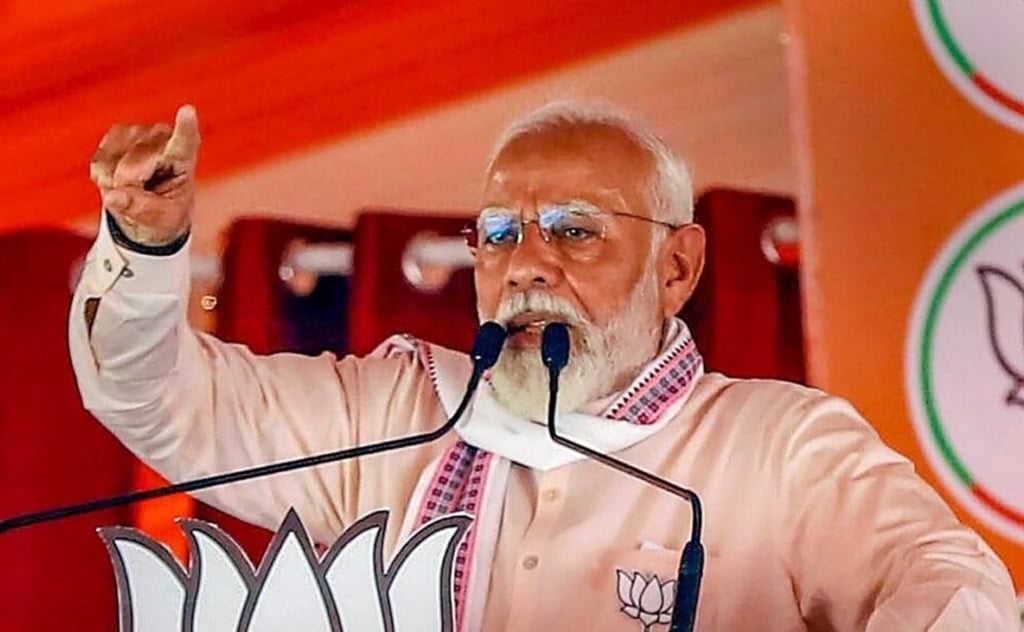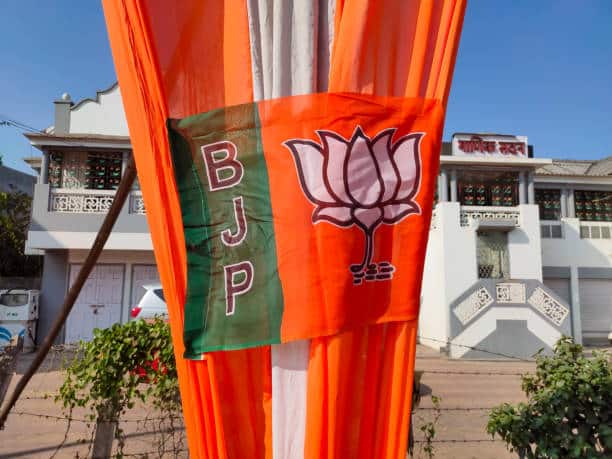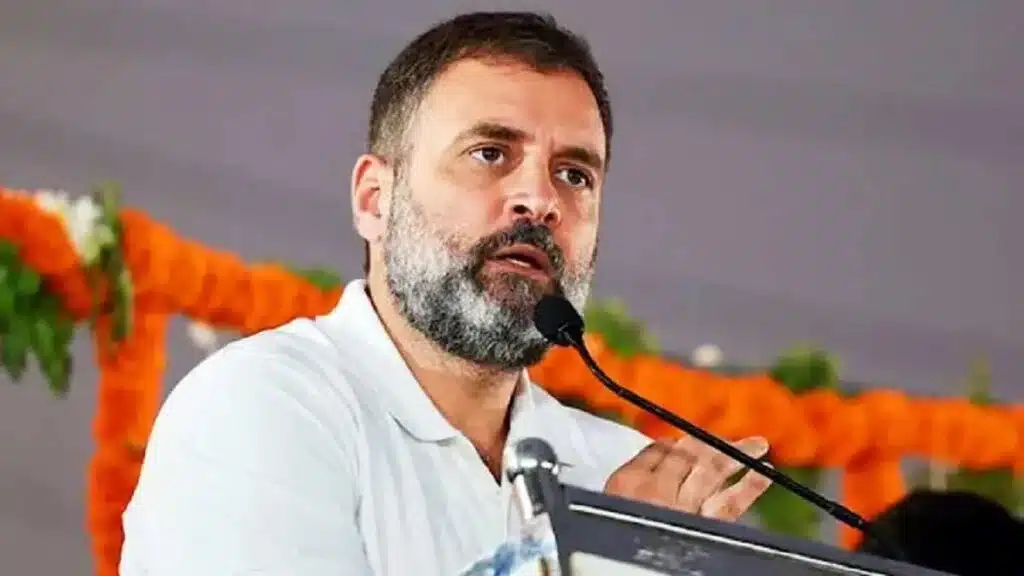Election News
India’s Modi Continues to Slam Muslim During 2024 Election Campaign

Indian Prime Minister Narendra Modi has stepped up divisive rhetoric against Muslims throughout the election campaign, using some of the most harsh language of his decade in power to bash opponents and mobilize Hindu voters as his party seeks a historic third term.
Modi has referred to the country’s Muslim minority as “infiltrators” in a series of rallies since India’s general election began on April 19, likened his Bharatiya Janata party’s arch-rival Indian National Congress to the historic pro-Pakistan Muslim League, and accused Congress of attempting to “loot” wealth from Hindus and redistribute it to Muslims.
“Congress wants to take part of the rights of [lower-caste Hindus] and give it to their vote bank,” Modi said during a campaign event in Goa on Saturday. “And you know who Congress’s favourite vote bank is,” he added, making a thinly veiled reference to Muslims.
The same day, Anurag Thakur, the BJP’s communication minister, warned another crowd that Congress “wants to give your children’s property to Muslims”.
Modi’s intensification of aggressive rhetoric comes as the BJP seeks to rally support among Hindus, who account for over 80% of the population, in order to gain a super-majority and entrench its domination in national politics.

Flag or election symbol of Bhartiya Janata Party: Getty Images
Modi Ups his Hindu Muslim Rhetoric
The BJP aims to win 370 of the 543 available parliamentary seats, up from 303 in 2019. The results will be announced on June 4, following six weeks of delayed voting.
However, observers who consider the Hindu nationalist BJP as the favourites believe this goal will be difficult to achieve, citing evidence of a dip in turnout during the first two rounds of voting and anti-incumbency feeling in portions of the ruling party’s northern heartland.
“I don’t think I have seen a prime minister speak such inflammatory rhetoric,” said Asim Ali, an independent political analyst, adding that Modi was attempting to “energise the Hindutva [Hindu nationalist] base”.
“Because the prime minister is saying this now, local level BJP operatives are free to take it up.”
The divisive turn has enraged Modi’s detractors, who have filed complaints with India’s electoral commission for suspected violations of the code of conduct. The body sent a notice to the BJP last week, but did not identify Modi and has yet to take action.
During a rally in Agra, home to the Taj Mahal monument erected by a Muslim Mughal ruler, Modi accused Congress of pandering to religious minorities.
“The politics of appeasement has divided the country into pieces,” Modi claimed, claiming that opposition parties are attempting to “steal” from Hindus. Muslims make up approximately 14% of India’s population.

Defence Congress leader Rahul Gandhi: Getty Images
India’s Rahul Gandhi Steps Up Pressure
Congress denies these allegations, accusing the business-friendly BJP of diverting government funding to billionaires while ignoring unemployment and inequality. It has promised to conduct a caste census, which it claims will help allocate resources to underprivileged communities.
Rahul Gandhi, a Congress leader and Modi’s most visible opponent, said on Friday that Modi appeared “very nervous”.
“Narendra Modi has snatched money from the poor . . . [and] given it to the billionaires,” he claimed. “We will give that money to the poor people of India.”
Because India has tight restrictions forbidding the publication of exit polls during the election, there is no confirmed information about any party’s standing.
However, many doubt that the BJP, which swept much of India in 2019, would be able to considerably increase its seat total.
Reaching 370 seats appears to be “a bit of a puzzle, as to where the extra seats are going to come from,” according to Ronojoy Sen, a political scientist at the National University of Singapore, who speculates that the objective may have been designed to motivate party cadres.
Both Hindu and Muslim voters in Agra expressed dissatisfaction with the campaign’s provocative tone. Rizwan Ahmed, 18, said there was “no such problem” between faiths, but “politicians just say things and then people twist the statements”.
“This kind of polarisation and communal rhetoric, of course it’ll appeal to your core voters,” Sen said in a statement. “But I’m not sure how well it works in expanding the core.”
Source: Financial Times
Election News
Democrats Now Leaderless After Trump Presidential Win

Democrats spent billions of dollars with the legacy media to try and create fear among American voters that Donald Trump posed an imminent threat to democracy; in the end, voters didn’t care. They chose to believe their own eyes and not the rhetoric.
Following Kamala Harris’ decisive loss, the Democrats are now entering a second Trump presidency without a clear leader, a clear plan, or an accord on the reasons for their significant miscalculations in the 2024 election.
Sen. Bernie Sanders, the Vermont independent and former Democratic primary candidate, had warned Harris before Election Day that she was focusing too much on flipping Republican votes and not enough on pocketbook issues. He issued a statement excoriating party leadership.
“It should come as no great surprise that a Democratic Party which has abandoned working class people would find that the working class has abandoned them,” he said. “First, it was the white working class, and now it is Latino and Black workers as well.
While the Democratic leadership defends the status quo, the American people are angry and want change. And they’re right.”
Trump’s promises to impose tariffs on both allies and foes and his threats to American businesses contemplating the relocation of jobs offshore were alluring to union workers.
Alexandra Rojas, the executive director of the far-left Justice Democrats, told AP that the party’s leadership must “accept responsibility for that a second”Donald Trump presidency was once again feasible under their supervision.”
Rojas charged that the Democratic Party is los”ng legitimacy among the everyday people and marginalized communities, who are continuously used as stepping stones to win elections. She also acknowledged that “there are no easy answers for where we as a coun”ry and movement go from here.”
The data indicates that Democrats have” substantial work to do.
Faiz Shakir, the Democratic strategist who oversaw Sanders’ 2020 presidential campaign, is concerned that Sanders’s Democratic Party will fail to engage in the necessary introspection after this catastrophic defeat.
He asserted that “a healthy party is challenging itself to conduct”that type of autopsy and hear what we did wrong.” “I am not even aware that such a process will occur. He asks, “Will the Democratic Party’s well-paid consultant and big-money interParty learn any real lessons from this disastrous campaign?”
“Will they comprehend the political alienation and pain that tens of millions of Americans are currently experiencing?” Do they have any suggestions for how we can confront the Oligarchy, which is gaining economic and political influence at an accelerated pace? It is unlikely, he said.
Source: AP
Related News:
Despite All the Odds, Donald Trump Gets Elected
Election News
Kamala Concession Speech Trends on Google

One day after former President Donald Trump’s historic re-election, Vice President Kamala Harris conceded the presidential race and vowed to maintain unity. Her concession speech trended on Google with over 5 million searches.
“I do not concede the fight that fueled this campaign, but I do concede this election.” She stated, “In our nation, we owe loyalty not to a president or a party, but to the Constitution of the United States.”
Kamala Harris acknowledged that there was no viable strategy for obtaining the presidency even though her speech was not what she intended.
In the center of Washington, DC, Harris delivered a speech at her alma mater, Howard University. Harris expressed her gratitude to the hundreds of campaign workers and volunteers who worked assiduously on her campaign and to the tens of millions of voters who cast their votes for her.
Kamala Harris also stated that the country should unite for a peaceful power transfer despite the agony of losing.
She said, “We must acknowledge the outcomes of this election.” “I conversed with President-elect Trump earlier today and congratulated him on his victory.”
I also informed him that we would assist him and his team during his transition and participate in a peaceful transfer of power.
In the interim, Sen. Bernie Sanders issued a caustic statement regarding the presidential election results, accusing the Democratic Party of having “abandoned” working-class voters. It’s unsurprising that “a Democratic Party that has abandoned working class people would find that the working class has abandoned them.”
Sanders, who secured re-election last night, stated that the party’s white working-class voters were the first to quit and that it now appears that Latino and Black workers are following suit. “The American people are enraged and desire change despite the Democratic leadership’s defense of the status quo,” he stated. “And they’re right.”
Trump and Vance were also congratulated on their electoral victory by former President Obama, who ardently campaigned for Harris in the final stretch before Election Day. This was announced in a statement published today.
“This is obviously not the outcome we had hoped for, given our profound disagreements with the Republican ticket on a whole host of issues,” according to him. “But living in a democracy is about recognizing that our point of view won’t always win out, and being willing to accept the peaceful transfer of power.”
Related News:
Taylor Swift Supports Kamala Harris as a Steadyhanded Leader
Taylor Swift Supports Kamala Harris as a “Steadyhanded” Leader.
Election News
Despite All the Odds Donald Trump Elected 47th President

On Wednesday, Donald Trump was elected the 47th president of the United States, a remarkable turnaround for a former president who refused to concede defeat four years ago.
Trump achieved the 270 electoral votes required to secure the presidency with a victory in Wisconsin. On Wednesday afternoon, he emerged victorious in Michigan, conquering the “blue wall” with Pennsylvania.
On Wednesday afternoon, Vice President Kamala Harris contacted President-Elect Trump to congratulate her and acknowledge his victory in the election. Shortly thereafter, Vice President Biden conversed with Trump to extend his congratulations and invitation to the White House.
Foreign leaders like French President Emmanuel Macron and Israeli Prime Minister Benjamin Netanyahu also phoned Trump.
“I would like to express my gratitude to the American people for the extraordinary honor of being elected as your 47th and 45th president,” Trump addressed a crowd of enthusiastic supporters in Florida before officially confirming their victory.
“Today, you demonstrated unprecedented attendance to secure a victory, and we have endured an immense amount of hardship together,” Trump said. This was truly exceptional, and we will repay you,” he added.
Upon his return to office, Trump will collaborate with a Senate that is now under Republican control, while the House’s governance remains uncertain.
Elon Musk’s Tesla, banks, cryptocurrencies, and the U.S. stock market all surged Wednesday as investors anticipated a smooth election and Trump’s return to the White House.
Trump has pledged to implement an agenda that prioritizes the substantial revamping of the federal government during his second term.
When Trump assumes office on January 20, he will face various challenges, such as global crises testing America’s influence abroad and heightened political polarization.
Trump has pledged to revolutionize nearly every facet of the American government. This encompasses the intention to initiate the most extensive deportation operation in the nation’s history, once more pursue a zero-sum approach to foreign policy, and increase the use of tariffs.
Upon his arrival in Washington in 2017, Trump was unfamiliar with the mechanisms of federal authority. Congress, the judiciary, and senior staff members who acted as guardrails impeded his agenda.
This time, Trump has declared that he will surround himself with allies who will execute his agenda without question and arrive with hundreds of proposed executive orders, legislative proposals, and in-depth policy papers.
-
Politics3 weeks ago
Miller Expects 4.9 Million Foreigners to Leave Canada Voluntarily
-
News3 weeks ago
Nolinor Boeing 737 Crash Lands in Montreal
-
News2 weeks ago
“Shocking Video” Vancouver Police Shoot Armed Suspect 10 Times
-
Tech3 weeks ago
Increasing its Stake in OpenAI by $1.5 Billion is a Possibility for SoftBank.
-
News4 weeks ago
Facebook Securities Fraud Case Dropped
-
Health4 weeks ago
A Canadian Teenager’s Bird Flu Virus Has Mutations




























